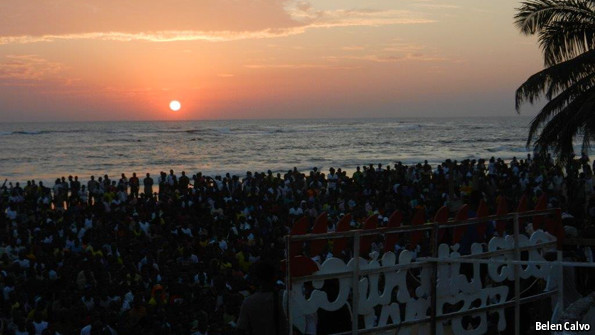NEWS
January 14, 2014

IN BRIEF
By: G.P. | ABUJA. This article was originally published by The Economist. Protest music in Liberia GIRLS in tight skirts and bright tops hold bottles of beer as they weave their way down the sandy lane towards Bernard’s Beach in Monrovia, Liberia’s capital. A throng of young Liberians have gathered at one of the year’s biggest parties and most revellers are celebrating the growing popularity of Hip Co, a musical movement in the long-troubled West African country. The beach stage is propped up against a skeletal building, a memory of more than a decade of civil war. The performers face out [...]
SHARE
Protest music in Liberia
GIRLS in tight skirts and bright tops hold bottles of beer as they weave their way down the sandy lane towards Bernard’s Beach in Monrovia, Liberia’s capital. A throng of young Liberians have gathered at one of the year’s biggest parties and most revellers are celebrating the growing popularity of Hip Co, a musical movement in the long-troubled West African country.
The beach stage is propped up against a skeletal building, a memory of more than a decade of civil war. The performers face out to thousands of young Liberians swaying in front of crashing waves. The smooth Hip Co beats keep the crowd dancing wildly in the sticky heat left by the orange sun as it sets.
Hip Co evolved in the 1980s and became a megaphone for voicing social and political concerns. A brutal 14-year civil war left around a quarter of a million people dead and an entire generation deprived of education and the ability to perpetuate their own culture.
For a long time, radio stations only played the tunes of synthesised voices from Nigeria or the latest American R ‘n’ B artist. But Liberia’s music industry is finally finding its feet. A repetitive rapping patois with messages of struggle and change on top of street noises and drum and xylophone rhythms has won over many young people. Junior Freeman and African Soldier’s Da My Area dominated the airwaves in 2011 and got a fair amount of play in clubs in neighbouring West African countries.
High rates of literacy coupled with a vernacular fusion and traditional Liberian sounds has made Hip Co a tool to reach out to disaffected, traumatised youth. One of Liberia’s most popular Hip Co artists, Jonathan Koffa—aka Takun J—has used his popularity to stoke political discussions, starring in the Hip Co festival for Human Rights in December. “If we don’t speak up against the ills in society, who will?” Takun J hollered to 10,000 Liberians attending the concert, before launching into his hit Police Man, a song tackling the corruption swirling around law enforcement in Liberia. When released, it prompted the authorities to arrest and brutally beat Takun J.
The policeman can take sides when he see money
The policeman not fair, policeman not right
Policeman judge your case, brother you’ll be scared…
“People listen to him and for many he is a role model. Music is more accessible for people in Liberia and the narrative is something everyone can relate to,” says Takun J’s manager, Norara Himian. The Hip Co Accountability Network led by Blair Glencorse has teamed up with 12 major Hip Co artists to prompt change.
Pot Boiling Remix featuring Romeo Lee, JD Donzo, Luckay Buckay, Takun J, and Bentman includes the following lyrics:
Everybody pot boiling, my pot can’t boil
The only time my pot can boil when a car kill the dog.
The government breaking so the youth is still jerking.
School fees got me sent from school cuz my pot not boiling.
Corruption in the city got me kicking some dust cuz my pot not boiling….
The Network is trying to tackle some of the major accountability issues shackling the country’s music industry that is largely focused on gospel music. “There is little regulation or copyright laws, no royalties for artists and piracy is still a large problem, making it difficult to establish and sustain a formal music industry,” says Ms Himian.
